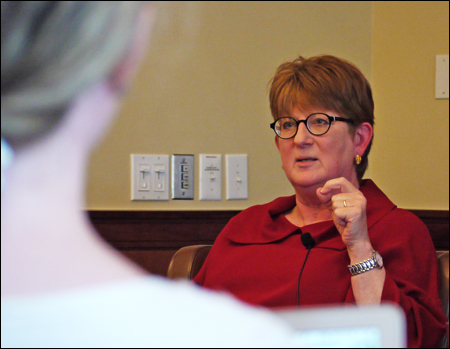
Kathleen Carroll, executive editor of The Associated Press, speaking at the Nieman Foundation on March 27, 2013. Photo by Jonathan Seitz
During a talk at the Nieman Foundation on March 27, 2013, Associated Press executive editor Kathleen Carroll—in response to a question from moderator Laura Wides-Munoz, AP Hispanic affairs reporter and 2013 Nieman Fellow—spoke about how she has balanced her career with that of her husband, journalist and author Steve Twomey:
First you need a good partner. Whoever your life partner is going to be, you’ve got to have somebody who’s going to be tolerant of your schedule and flexible, and for whom you can be tolerant if you’re in the same profession, since none of us seem to be able to date outside the realm of journalists, lawyers, nurses, and occasional businessmen and women. Steve and I, for a very long time, managed a “your turn, my turn” kind of thing. We didn’t set out to do it that way, but we decided to manage things that way. An opportunity came along for him, and I went along; then I wanted to do a certain kind of journalism and he came along and got a job in Washington. So we did it back and forth for some years, but this job kind of blew that out. He’s doing book writing now, so it seems to work out.
I raised this the other day with Sandy Rowe, who’s the retired editor of The Oregonian and just a wonderful editor and a wonderful mother and grandmother. She said, “Well, you can’t have it all. You just have to choose.” My variation of that would be “Well, what’s ‘all’? You get to define what ‘all’ is.” You can have it all, if you define what it is that you want. Do you make choices? You bet. My son will still give me a hard time about some thing that I don’t remember from his middle school career, but he and I both know that it’s a meaningless fact that I’ve failed to remember for 10 years now. You can do it. You just can do it.
When I started out in this business, 1973, I got my first job at The Dallas Morning News. God bless ’em, but there was no maternity policy there. I was one of the first “girls”— because I was 18—who didn’t have to go through the women’s pages. There were two other women in the city room, and one of them had to have her children on vacation, or quit. I mean, it’s so much better now than it was. You have the choice. The women ahead of us didn’t have a choice. It was very hard for them to have families and have careers. I had a choice. You have a choice. Now men are in this conversation too, which is fantastic. So don’t sweat over it so much, jeez.
Excerpts from the full discussion:


